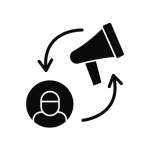PPC Marketing AgencyPay Per Click (PPC) - the name says it all. With your PPC campaigns and our expert PPC marketers you can get quick results, generating traffic to your website and revenue for your business.
|
We're Expert PPC Marketers and we're here to help!
At Bottom Line Marketing, we understand the dynamic landscape of pay-per-click (PPC) marketing. Our seasoned PPC marketers are committed to driving exceptional results for clients of all sizes, leveraging cutting-edge strategies tailored to your unique business needs. On this page you'll learn why PPC is a part of every successful company's marketing mix.
With so many PPC options and platforms available, it can be difficult to know where to start! Book a free ppc marketing consultation to find out how we can use PPC to bring your more business today!
With so many PPC options and platforms available, it can be difficult to know where to start! Book a free ppc marketing consultation to find out how we can use PPC to bring your more business today!
What is PPC and why does it matter? |
What Is Pay-Per-Click (PPC) Marketing?
Pay-Per-Click (PPC) marketing is a digital advertising model where businesses can display ads on search engines, websites, and social media platforms and are charged a fee each time one of their ads is clicked. This method is a cornerstone of search engine marketing (SEM) and stands out for its unique potential to deliver targeted traffic to your website rapidly. Speed to Market - The Immediate Impact of PPC Unlike organic search strategies, which take time to build visibility, PPC offers immediate results. By placing your brand at the top of search engine results for specific keywords, PPC ensures that your message reaches the right audience at the right time. This direct approach is especially effective for businesses looking to increase visibility quickly or capitalize on time-sensitive opportunities. Targeted Advertising With Precision One of the primary benefits of PPC is its granular targeting options. Advertisers have the flexibility to target their audience based on demographics, interests, geography, and even their behaviour. This precision ensures that your advertising budget is spent efficiently, reaching potential customers who are more likely to be interested in your products or services. Measurable ROI PPC advertising is also highly measurable. With the wealth of data available through PPC campaigns, businesses can track exactly what they are getting in return for their ad spend. Metrics such as click-through rates (CTR), conversion rates, and return on ad spend (ROAS) are critical in evaluating the success of campaigns and guiding future marketing strategies. The Role of PPC in Your Marketing Mix Incorporating PPC into your marketing mix can complement your SEO efforts, providing a complete search engine marketing strategy that balances long-term growth with immediate visibility. PPC can be particularly effective for new product launches, promotional campaigns, and for businesses looking to establish a foothold in a competitive market quickly. The Benefits of PPC Marketing in small markets like the Cayman Islands Crafting a successful PPC campaign begins with pinpoint precision in audience targeting. For niche markets, such as those in the Caribbean, or when your focus is on customers within a stone's throw of your business, PPC advertising becomes highly efficient. The beauty of such targeted reach is the ability to engage with a refined audience—the ones most inclined to take action—without the need for a hefty ad budget. Enhancing this strategic advantage, your campaign hones in on more than just location. It delves deeper, tapping into specific demographics, aligning with defined interests, and seizing the right keywords. This isn't just targeting; it's targeting with a laser focus. It’s about zeroing in on users whose intent to purchase is at its peak. By doing so, every dollar you invest is optimized, each ad is a step closer to conversion, and your business is perfectly poised to capture the attention of high-intent customers ready to engage with your brand. PPC by the Numbers A Winning Return on Investment: On average, businesses earn $2 for every $1 spent on PPC. This impressive 2:1 return on investment ratio exemplifies the financial efficacy of PPC campaigns. It’s not just about reaching audiences but doing so in a manner that significantly boosts your bottom line. With professional PPC marketers on your side, this ROI can be improved to provide even better results. Investment Scale for Growth: Small to mid-sized companies typically invest between $9,000 and $10,000 per month on PPC campaigns. This range indicates a scalable marketing investment that companies are making to ensure their visibility in a cluttered digital space, tailoring their spend to match ambitious growth objectives. Broad Adoption Amongst SMEs: With 65% of small to mid-sized businesses participating in PPC campaigns, this statistic reflects a robust trend of adoption. It underscores the reality that PPC has become a staple of the digital marketing toolkit for growth-oriented businesses, recognizing the potential it holds for lead generation and sales conversion. Capturing High-Intent Audiences: A staggering 65% of high-intent searches lead to an ad click. This figure is a testament to the power of PPC ads to attract users who are at the brink of making a purchase decision. By positioning your ads effectively, you are able to capture the attention of consumers who are poised to convert, thereby accelerating the sales cycle. Incorporating PPC into your digital marketing strategy is not just about following a trend; it’s about leveraging a data-backed approach to garner substantial returns, reach ready-to-buy audiences, and carve out a dominant presence in your industry segment. |
Types of PPC Ads
| Type of Ad | Description | Pros | Cons | Popular Platforms |
|---|---|---|---|---|
| Search Ads | Appear on search engine results pages when specific keywords are queried, capturing high-intent traffic. | Highly targeted, immediate visibility, effective for lead generation. | Can be expensive, requires constant optimization. | Google Ads, Bing Ads |
| Display Ads | Show interactive banners or videos across websites, not limited to search engines. | Increases brand awareness, visual appeal, broad reach. | Lower click-through rate, can be ignored as "background noise." | Google Display Network, Facebook. |
| Social Media Ads | Appear in feeds on platforms like Facebook, Instagram, LinkedIn, and can be targeted based on demographics, interests. | High engagement, specific audience targeting, variety of ad formats. | Can be seen as intrusive, rapid ad fatigue. | Facebook, Instagram, LinkedIn, Twitter. |
| Remarketing Ads | Re-engage users who have interacted with your site but haven't converted by following them across the web. | Highly personalized, improved conversion rates, cost-effective. | May be seen as intrusive, privacy concerns. | Google Ads, Facebook. |
| Shopping Ads | Showcase products directly in search results, with images, prices, and store information. | Direct link to purchase, visually engaging, effective for e-commerce. | Limited to e-commerce, requires maintenance of product feed. | Google Shopping, Bing Shopping. |
| Video Ads | Engage users through dynamic storytelling in video format, on platforms like YouTube. | High engagement, strong storytelling potential, good for brand recall. | Production can be costly, may be skipped if not engaging. | YouTube, Facebook Video, Instagram Video. |
Search vs Other PPC
|
Search
The difference between search and other PPC is a question of supply and demand. Search is limited to what people are searching for on search engines or Amazon PPC. That means you can only show your ad if someone if searching for a related keyword. The best part about this is that search clicks will have higher purchasing intent. Why? Because the user is actively searching for information or a product or service, and you are supplying an answer for that search. The downside is that it's not scalable beyond what people are searching for, and some keywords have lots of competition, making the Cost-per-Click so high that it's harder to make these campaigns profitable. |
Other PPC
Unlike search ads, other PPC such as social media ads or display ads are not served when someone is actively searching, but are instead the result of your targeting, based on a user's demographics, their behaviour, their location, and/or interests. The bad news is that these ads will result in clicks that have for the most part less purchasing intent compared to search ads, because you are not providing your ad as the immediate result of a search. The good news is that this approach is more scalable. It can also be easier to keep costs down and with a little creativity and targeting magic, you can most likely get cheaper results than you would on search. |
How to create a successful PPC strategy in 5 steps
Step 1: Craft Detailed Marketing Personas
Before diving into the vast ocean of PPC, anchor your strategy by sculpting detailed marketing personas. Understand the intricacies of your audience's needs, desires, and online behaviors. These personas are not merely fictional characters; they are the backbone of your campaign, guiding every decision and keyword choice. By pinpointing who your customers are, their challenges, and how they seek solutions, you tailor your PPC efforts to resonate deeply, driving not just clicks, but meaningful engagement.
Before diving into the vast ocean of PPC, anchor your strategy by sculpting detailed marketing personas. Understand the intricacies of your audience's needs, desires, and online behaviors. These personas are not merely fictional characters; they are the backbone of your campaign, guiding every decision and keyword choice. By pinpointing who your customers are, their challenges, and how they seek solutions, you tailor your PPC efforts to resonate deeply, driving not just clicks, but meaningful engagement.
Step 2: Select Your Marketing Channels
The digital realm is your chessboard, and choosing where to make your move is crucial. Analyze the myriad of channels at your disposal, from the search engine giants like Google and Bing to the bustling marketplaces of social media platforms. Determine where your personas spend their time and where your brand can shine brightest. It's not just about presence; it's about making profitable, consistent, and scalable connections. A well-placed ad on the right channel is a beacon for your target audience, leading them straight to your offerings.
The digital realm is your chessboard, and choosing where to make your move is crucial. Analyze the myriad of channels at your disposal, from the search engine giants like Google and Bing to the bustling marketplaces of social media platforms. Determine where your personas spend their time and where your brand can shine brightest. It's not just about presence; it's about making profitable, consistent, and scalable connections. A well-placed ad on the right channel is a beacon for your target audience, leading them straight to your offerings.
Step 3: Craft Your Ads & Landing Pages
With your audience and channels defined, it's time to forge the message that will act as the siren song for your personas. Here, creativity meets analytics. Design ads and landing pages that speak directly to the needs you've identified, with clear calls to action that align with user intent. Every headline, image, and button is a brushstroke in this masterpiece, painting the path from prospect to customer with clear and compelling storytelling.
With your audience and channels defined, it's time to forge the message that will act as the siren song for your personas. Here, creativity meets analytics. Design ads and landing pages that speak directly to the needs you've identified, with clear calls to action that align with user intent. Every headline, image, and button is a brushstroke in this masterpiece, painting the path from prospect to customer with clear and compelling storytelling.
Step 4: Launch Your Ads
Set sail with your campaign, launching your ads into the digital currents. But a captain doesn't leave the ship's wheel after setting course. Monitor every metric, from click-through rates to conversion paths. The beauty of PPC is in its measurability; every interaction is a treasure trove of data, offering insights into the efficacy of your creative and strategic choices. Track diligently, for knowledge in this realm is power - the power to pivot, to optimize, and to soar.
Set sail with your campaign, launching your ads into the digital currents. But a captain doesn't leave the ship's wheel after setting course. Monitor every metric, from click-through rates to conversion paths. The beauty of PPC is in its measurability; every interaction is a treasure trove of data, offering insights into the efficacy of your creative and strategic choices. Track diligently, for knowledge in this realm is power - the power to pivot, to optimize, and to soar.
Step 5: Analyze & Optimize -The Art of Refinement
The final, ongoing step is the artful dance of analysis and optimization. Use the rich data at your fingertips to tweak and refine your campaigns. Test different ad copy, landing page designs, and bidding strategies to find the perfect alchemy for your objectives. This phase is about evolution, learning from the landscape, and enhancing your strategy with surgical precision.
Want our PPC Marketers to help you apply your own strategy for success? Get in touch ⬇️
The final, ongoing step is the artful dance of analysis and optimization. Use the rich data at your fingertips to tweak and refine your campaigns. Test different ad copy, landing page designs, and bidding strategies to find the perfect alchemy for your objectives. This phase is about evolution, learning from the landscape, and enhancing your strategy with surgical precision.
Want our PPC Marketers to help you apply your own strategy for success? Get in touch ⬇️
Want more revenue without doing the heavy lifting? Get the most out of your business with PPC marketing. Drop us a message and we'll find a time to have a free consultation call.
Search AdsCapture the immediate intent of potential customers searching for your products or services. Our expertly crafted search ads place your business at the pinnacle of search results, driving high-quality traffic and skyrocketing conversions with targeted, text-based messaging.
|
Display AdsEngage users with stunning visuals and compelling messages through display ads. We create visually appealing content that resonates with viewers across the Google Display Network and beyond, fostering brand recall and funneling engaged traffic back to your site. For more info take a look at our graphic design services.
|
Social Media AdsUtilize the immense reach of social platforms to communicate directly with your audience. Our social media campaigns translate likes and shares into valuable clicks and sales, with tailored ads that amplify engagement and drive social sharing.
|
Shopping AdsRevolutionize your product visibility with shopping ads that display your merchandise directly in search results. We streamline the shopper’s journey from interest to purchase, showcasing your products with clear images, prices, and your store name at the moment they search.
|
Remarketing AdsConvert past visitors into customers with strategic remarketing. Our campaigns subtly remind your audience of their previous interests, drawing them back to your site to complete their purchase with targeted and personalized messaging.
|
Video AdsIf a picture is worth a thousand words, a video is priceless! Tell your brand's story through dynamic video ads. We craft engaging narratives with motion and sound, capturing viewers' attention on platforms like YouTube and prompting them to act, all while weaving your message into their digital experience.
|
Amazon PPCHave a great product on Amazon but nobody is seeing it? Use Amazon PPC ads to get your products in front of the users most likely to buy them! Rack up engagement, sales, and reviews with PPC on the world's biggest eCommerce platform!
|
Sponsored ContentEver see those sponsored ads on news sites like CNN? It's not just for large advertisers. We can help you create similar ads without spending a lot by using platforms like Outbrain to sponsor content on the world's most trusted news sites!
|
In-App AdvertisingReach your audience within their daily digital habits through in-app advertising. We design ads that are a natural part of the user experience, whether in games, productivity tools, or social apps, ensuring your brand is part of the conversation.
|
PPC in the Cayman Islands
When it comes to smaller markets like Cayman Islands there are several important factors to keep in mind. Here we look at 3 important points that will help you get the most out of your PPC campaigns.
|
Leveraging Local Insights for PPC Campaigns:
To maximize the impact of PPC campaigns in the Cayman Islands, businesses should leverage local insights and data. Understanding the local consumer's online behavior, preferences, and search trends can provide valuable guidance for campaign optimization. For instance, incorporating popular local search terms, addressing local needs in ad copy, and aligning ad schedules with the Cayman Islands' time zone and peak internet usage times can enhance campaign performance and ROI. |
Adapting PPC for the Cayman Islands Market:
In the Cayman Islands, where the market dynamics and consumer behaviors are unique, PPC campaigns must be precisely tailored to resonate with the local audience. This involves utilizing geo-targeting to focus on specific areas within the islands, adapting ad copy to reflect local language nuances, and aligning campaigns with local events or seasonal trends. By customizing PPC strategies to the local context, businesses can significantly increase their ad relevance and effectiveness, capturing the attention of potential customers in the Cayman Islands more efficiently. |
Optimizing for a Tourism-Driven Economy:
Given the significant role of tourism in the Cayman Islands' economy, businesses can benefit from PPC campaigns that target tourists. This might include creating ads specifically designed to attract visitors, using languages commonly spoken by tourists, and promoting services or products that appeal to those visiting the islands. Additionally, retargeting campaigns can be an effective way to re-engage visitors who have shown interest in related services or activities during their stay or in their planning stages. |
1. What does PPC stand for?
PPC stands for Pay-Per-Click, a digital marketing model where advertisers pay a fee each time one of their ads is clicked.
2. How do you write a PPC strategy?
Writing a PPC strategy involves identifying your target audience, setting clear goals, choosing the right platforms, creating engaging ads, and continuously testing and optimizing your campaigns. Read the 5 steps of PPC marketing strategy above for more information.
3. What are the 5 key aspects of PPC Search Ads?
The 5 key aspects of PPC are keyword research, ad copywriting, landing page relevance, bid management, and performance monitoring.
4. Is PPC a good marketing strategy?
PPC can be an excellent marketing strategy as it provides quick campaign launch, measurable results, high relevance, and direct targeting options.
5. Is PPC marketing hard?
PPC marketing can be complex due to its dynamic nature and the need for ongoing management and optimization, but with the right knowledge and tools, it can be mastered.
6. What is CPC vs PPC in marketing?
CPC, or Cost Per Click, refers to the actual price you pay for each click in your PPC campaigns. PPC is the overall strategy and model, while CPC is a metric within it.
7. What is the difference between PPC and SEO?
PPC is a paid strategy where you pay for clicks, while SEO (Search Engine Optimization) focuses on optimizing your site to rank higher organically, without directly paying for placement. PPC will get you immediate results and is a better short term strategy. Meanwhile SEO is a better long-term strategy but it takes time to see results.
8. How effective is PPC marketing?
PPC marketing is highly effective when well-executed, with benefits like immediate traffic, granular targeting, and detailed performance data.
9. What is the most common form of PPC advertising?
The most common form of PPC advertising is search engine advertising, such as Google Ads, where ads appear in search engine results.
10. What kind of PPC advertising should I use?
The type of PPC advertising to use depends on your business goals, target audience, and budget. Options include search ads, display ads, social media ads, remarketing, and shopping ads.
11. What is the average cost per click in PPC?
The average cost per click in PPC varies widely depending on the industry, competition, and chosen keywords. It can range from a few cents to several dollars.
12. What ads are PPC?
PPC ads include search ads, display ads, social media ads, shopping ads, video ads, and remarketing ads, among others.
13. What is PPC in simple words?
PPC is a digital advertising method where businesses only pay when someone clicks on their ad.
14. What PPC platform provides the best ROI?
The PPC platform with the best ROI can vary depending on the business and campaign; however, Google Ads is often cited for its broad reach and robust targeting options.
15. Can PPC help my business grow?
Yes, PPC can significantly contribute to business growth by driving targeted traffic, increasing sales, and building brand awareness.
16. How quickly can I see results with PPC?
One of the advantages of PPC is that you can see results almost immediately after your ads go live.
17. What should my daily budget for PPC be?
Your daily PPC budget should be based on your business's marketing budget, cost per click, and the competitiveness of the keywords you're targeting.
18. How can I improve my PPC campaigns?
Improve your PPC campaigns by refining your keyword lists, optimizing ad copy, improving landing pages, and using bid management strategies.
19. What are negative keywords in PPC?
Negative keywords are words or phrases that you add to your PPC campaigns to prevent your ads from showing for irrelevant searches. Sometimes what you don't target is as important as what you do target.
20. Can I do PPC myself, or should I hire an expert?
While you can start PPC yourself, managing a campaign effectively requires expertise. Hiring an expert or agency can save time and increase the campaign's effectiveness.
PPC stands for Pay-Per-Click, a digital marketing model where advertisers pay a fee each time one of their ads is clicked.
2. How do you write a PPC strategy?
Writing a PPC strategy involves identifying your target audience, setting clear goals, choosing the right platforms, creating engaging ads, and continuously testing and optimizing your campaigns. Read the 5 steps of PPC marketing strategy above for more information.
3. What are the 5 key aspects of PPC Search Ads?
The 5 key aspects of PPC are keyword research, ad copywriting, landing page relevance, bid management, and performance monitoring.
4. Is PPC a good marketing strategy?
PPC can be an excellent marketing strategy as it provides quick campaign launch, measurable results, high relevance, and direct targeting options.
5. Is PPC marketing hard?
PPC marketing can be complex due to its dynamic nature and the need for ongoing management and optimization, but with the right knowledge and tools, it can be mastered.
6. What is CPC vs PPC in marketing?
CPC, or Cost Per Click, refers to the actual price you pay for each click in your PPC campaigns. PPC is the overall strategy and model, while CPC is a metric within it.
7. What is the difference between PPC and SEO?
PPC is a paid strategy where you pay for clicks, while SEO (Search Engine Optimization) focuses on optimizing your site to rank higher organically, without directly paying for placement. PPC will get you immediate results and is a better short term strategy. Meanwhile SEO is a better long-term strategy but it takes time to see results.
8. How effective is PPC marketing?
PPC marketing is highly effective when well-executed, with benefits like immediate traffic, granular targeting, and detailed performance data.
9. What is the most common form of PPC advertising?
The most common form of PPC advertising is search engine advertising, such as Google Ads, where ads appear in search engine results.
10. What kind of PPC advertising should I use?
The type of PPC advertising to use depends on your business goals, target audience, and budget. Options include search ads, display ads, social media ads, remarketing, and shopping ads.
11. What is the average cost per click in PPC?
The average cost per click in PPC varies widely depending on the industry, competition, and chosen keywords. It can range from a few cents to several dollars.
12. What ads are PPC?
PPC ads include search ads, display ads, social media ads, shopping ads, video ads, and remarketing ads, among others.
13. What is PPC in simple words?
PPC is a digital advertising method where businesses only pay when someone clicks on their ad.
14. What PPC platform provides the best ROI?
The PPC platform with the best ROI can vary depending on the business and campaign; however, Google Ads is often cited for its broad reach and robust targeting options.
15. Can PPC help my business grow?
Yes, PPC can significantly contribute to business growth by driving targeted traffic, increasing sales, and building brand awareness.
16. How quickly can I see results with PPC?
One of the advantages of PPC is that you can see results almost immediately after your ads go live.
17. What should my daily budget for PPC be?
Your daily PPC budget should be based on your business's marketing budget, cost per click, and the competitiveness of the keywords you're targeting.
18. How can I improve my PPC campaigns?
Improve your PPC campaigns by refining your keyword lists, optimizing ad copy, improving landing pages, and using bid management strategies.
19. What are negative keywords in PPC?
Negative keywords are words or phrases that you add to your PPC campaigns to prevent your ads from showing for irrelevant searches. Sometimes what you don't target is as important as what you do target.
20. Can I do PPC myself, or should I hire an expert?
While you can start PPC yourself, managing a campaign effectively requires expertise. Hiring an expert or agency can save time and increase the campaign's effectiveness.













